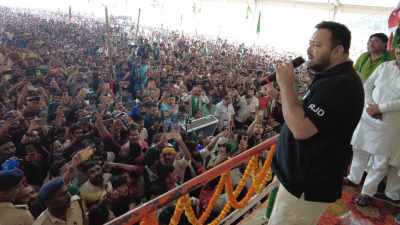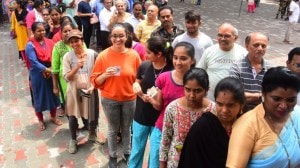From the Right to Water Campaign
• This is in response to your article “Our poor little rich”. I am writing this on behalf of Parivartan and Right to Water Ca...

• This is in response to your article “Our poor little rich”. I am writing this on behalf of Parivartan and Right to Water Campaign in Delhi. I wish to clarify some factual errors in the article.
The entire campaign against Delhi’s water sector “reforms” is not confined to the middle class. It cuts across all sections of society. In the last few weeks, there have been several rallies and protest meetings in several slum areas. About 100 people from resettlement colonies met Sonia Gandhi last week and requested her to withdraw this project. In several of these meetings, a similar call was made by the people that if the government did not withdraw this project and the water tariff hike, they would stop paying their water bills. All these events were sent to the press for coverage. Unfortunately, none of them were reported. But when some people from South Delhi met and made the same call, the entire media took note. This does not mean that the movement against water project is exclusive to South Delhi based middle class, but it only reflects media biases.
It is also factually wrong that the campaign is demanding the perpetuation of subsidies. We are demanding a roll-back of the April water tariff hike for several reasons – the new tariff structure talks of fixed charges which is against the principle of efficiency.. It militates against the water conservation, the new structure was determined by the World Bank and its consultants to ensure guaranteed profits for water companies. All of us at the campaign admit that water tariffs before the recent hike were abnormally low and needed revision. However, tariff revision should have been worked out through public consultations and should promote efficiency and conservation. Various public consultations done by us in the past few months have thrown up a tariff structure, which while providing water to the poor at cheap rates, would also wipe out the losses of DJB without requiring any subsidies from the government.
The Delhi government is implementing a completely bizarre project in the name of reforms. About 50 professors from IIMs and several engineers from IITs have written to the Delhi Government requesting withdrawal of this project. We have ourselves made detailed presentations to various officers of the Delhi Government. But the government refuses to listen. When the Governments become deaf and dumb, what are the citizens supposed to do? In these circumstances, if people resort to non-payment of bills to shake the Government to hear them, I would not call it anarchy. The Governance of our country today is in anarchy. The decision of the Delhi Government to even consider implementing such a bizarre project is anarchy. You have suggested that putting these middle class people in a police lock up for 24 hours would do. I offer myself, and I am sure there are many others like me, to be put behind police lock up for the “crime” committed by us. I can only assure you that that won’t do. We will continue with our demands. We will oppose this project till the very end. I am also not sure whether we have sufficient laws available to put people behind police lock ups if they refused to pay their water bills. Maybe you would need to change the laws to do that. Mr Gupta, I request you to take a look at the project which we are opposing. Either you convince us that we are wrong and we will withdraw our movement. Or if we convince you, I am sure you would join us in declaring that you would also not pay your water bills if this project were not withdrawn.
— Arvind Kejriwal
Punjab free power to farmers
• Take the example of sanctioning of free power for the farmers and Dalits by Captain Amarinder Singh’s government even against the advice of the PM. If a survey is conducted by The Indian Express, it would be found that real beneficiaries of free power would be big landlords, and all politicians including members of Bharat Kisan Union, who pay no income tax. But what the can poor Captain do, the next elections are due in early 2007, when supply of free power to farmers and Dalits would be on top of Badal’s agenda
—Dalip Singh Ghuman
Covering blistering sores with sunscreen lotion
• Congratulations on your article. We are in a phase of “pungent morality” where we seem to be covering blistering sores with sunscreen lotion. We may succeed in hiding it from the outside view for some time or even find some local anesthetic comfort. It will take deeper diagnosis and cleansing to really cure them. “Regressive subsidies” – poor’s underpaid labor being expropriated by the rich – must be weeded out from our system.
—Chandra Vikash
Pampered children throwing tantrums
• My first premise, borne by history, is that most human beings desire a free lunch, which is basically a lunch at somebody else’s expense. An extension of this premise is my belief that most people will bend and break rules to get a free lunch. Socialism everywhere failed because of the validity of this basic premise. Because if this is true, then the least corrupt system is likely to be where there is minimum control by one person over another (or millions of others). All the systems put in place in independent India promoted this control, including all the areas you mention. My second premise is that there is always some anarchy. You can choose between anarchy of the government, or of the masses, or of the middle class, or the military, or the South Delhi Socialists. Since the Delhiwallahs are fewer in number, thank God, than the majority of Indians, we find their anarchy unpalatable, and we should. Not least because we dont like to see pampered children throwing tantrums. The result of the poor little rich continuing the way they are will be growing inequalities between the poor and the middle class, and consequential social upheaval. I hope that this upheaval will not be violent, but I wonder. The first step to any solution should be a gradual removal of all subsidies for everyone. But, besides the financial ramifications on all of us, rich or poor, my problem is this: I do not want to be subsidised for anything. However, I do not want to pay towards corruption and huge inefficiency either.
—Capt. Manu Mahajan
Lock this one up!
• To use the police lock-up threat is another example of the colonial mind-set many of us can not seem to avoid. I find it so strange that even you have used this threat, but I find it even stranger to learn that it is no longer a threat that scares our rich little poor in free India. You see, to reach here, most of us faced much worse.
—Veeresh Malik
Dark deeds enacted during dark hours!
• I remember, a colleague of mine, (and sorry to say, he is a television journalist fighting to expose the system!!), who recently bought a kothi in Noida, was having a discussion with his friend for finding ways to put a spoke on the electricity meter after he installed two air-conditioners at his new home so that the electricity charges could be kept to a minimum. Apparently a linesman in his area (Noida) promised my colleague that he could easily do so if he makes a one time payment of Rs.10,000/- and my colleague was negotiating with this person to reduce the amount to a “reasonable level”.
—K. Aravmudhan
The middle class speaks
• Your article is sure to appeal to a large section of IE readers who are fed up with the ways of the upper middle class. However, since I belong to this class of abhorred citizens, I find it essential to defend our case. An an introduction: the middle class in India is neither as naïve as the wretched poor nor ignorant as the filthy rich. They are mostly a practical/realistic lot. But practical people are also pessimistic. We are well aware of our rights. We are also educated enough to see through the propagandist blah blah of our politicians and “intellectuals”. Superficial analyses (a trade mark of Indian journalism) will not address the core issues faced by our nation. We need leaders who are intelligent – who can think and dream. Unfortunately these are qualities alien to our current crop of leaders (with avowed left, right, socialist, secularist or fascist orientations). In this context, I request you to spare the middle class. Let them contribute silently to the well being of our society. At the same time, I am ashamed of the black sheep among us.
—Prathapan






- 01
- 02
- 03
- 04
- 05

























